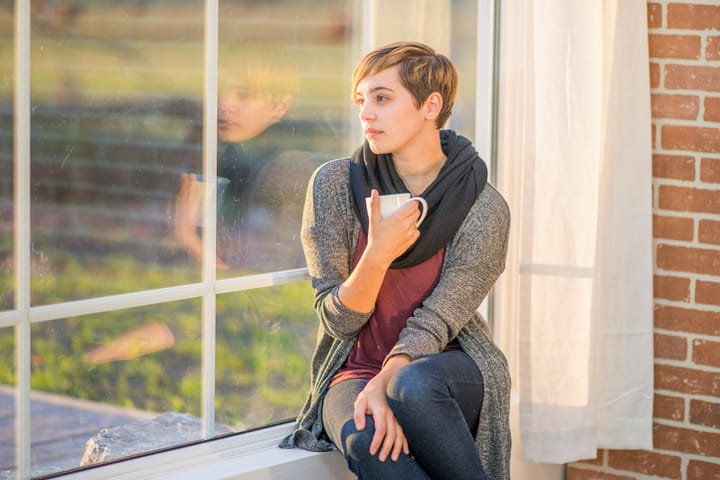Loneliness can be tough, and wanting connection is completely normal. However, when someone seems terrified of being alone, it might indicate a deeper issue. Constantly needing people around or not being able to enjoy their own company can be damaging. Here are some of those unhealthy habits that someone might display when they struggle with solitude.
1. Clingy Behavior

Fear of being alone can lead to suffocating other people. They might text constantly, demand constant companionship, or become easily jealous in friendships and relationships. This stems from insecurity and a reliance on other people to fill an inner void. It’s like they’re afraid if someone they care about isn’t around, they’ll cease to exist.
2. Serial Dating

They bounce from relationship to relationship because they just can’t stand being single. Partners become a way to numb the loneliness rather than a way to form and enjoy genuine connections. This pattern often leads to unhealthy relationships chosen out of desperation. It’s a temporary fix that ultimately leaves them feeling even more empty.
3. Distraction Addiction

They constantly seek distraction – scrolling social media, binge-watching TV, or partying excessively. These distractions numb the discomfort of their own company and fill the silence with external stimulation. However, that nagging feeling of loneliness always creeps back in when the distractions fade.
4. Codependency

They prioritize other people’s needs to an unhealthy degree, losing their sense of self in the process. This often stems from a need to feel needed and an attempt to avoid their own inner world. It’s like their identity gets wrapped up in who they’re taking care of and they don’t know how to separate themselves from it.
5. Approval Seeking

Their decisions are driven by the desire to be liked and accepted. Fear of rejection makes them people-pleasers, molding themselves to other people’s expectations at the cost of their authenticity. They’d rather be liked than truly be themselves, which ironically makes genuine connection harder.
6. Impulsive Decision-Making

Fear of being alone can lead to impulsive choices. They might accept social invitations they don’t truly want or say “yes” to things they later regret just to avoid being by themselves. Deep down, they know it’s not good for them, but avoiding that empty feeling becomes the priority.
7. Difficulty Dealing with Feelings

They struggle to sit with uncomfortable emotions like sadness, loneliness, or boredom. Without external distractions, they may turn to unhealthy coping mechanisms to avoid facing their inner states. It’s scary to sit with those uncomfortable feelings, but running from them only prolongs the problem.
8. Struggling to Set Boundaries

Fear of abandonment makes them say “yes” even when they want to say “no.” They overextend themselves, feeling obligated to always be available in an attempt to keep people close. This leads to resentment and burnout, which just damages their sense of self even further. This constant need to please anyone and everyone leaves them feeling depleted and disconnected from their own needs.
9. Self-Sabotage

They might subconsciously undermine their own relationships because deep down, they’re afraid of genuine closeness and intimacy. So, they end up creating conflicts or distancing themselves before someone can truly hurt them. It’s a self-protective mechanism but ultimately a really lonely one.
10. Idealizing Past Relationships

They romanticize past partners and situations and completely ignore the reality of those relationships. This keeps them focused on the past rather than dealing with the loneliness of the present or envisioning a different future. Nostalgia becomes a safe haven, preventing them from moving forward. Sadly, clinging to idealized memories prevents them from finding healthy love in the here and now.
11. Avoiding Introspection

They avoid self-reflection like the plague. The discomfort of looking inward and addressing the root of their fear of being alone is too daunting, so they opt for distractions instead. True change often requires facing those uncomfortable truths about ourselves. Without introspection, they lack the self-awareness to build the inner resources needed to be comfortable on their own.
12. Emotional Outbursts

The pressure of constantly suppressing their true feelings can lead to emotional outbursts. Anger, anxiety, or seemingly unprovoked sadness leak out in unpredictable ways. It’s their unexpressed internal struggle manifesting externally. These outbursts often alienate everyone around them, which then makes their sense of isolation even worse.
13. FOMO (Fear of Missing Out)
They obsessively monitor social media, agonizing over what everyone else is doing. Seeing other people having fun intensifies their own sense of loneliness, creating a vicious cycle. Comparison truly is the thief of joy. Their self-worth becomes tied to other people’s experiences, leaving them feeling inadequate.
14. Fantasizing About “The One”
They hold onto the belief that finding the perfect partner will solve all their problems. This idealized expectation sets them up for disappointment and prevents them from focusing on their own growth. It’s like waiting for a magic solution instead of doing the inner work. They outsource their happiness to a hypothetical person, ignoring their own power to create happiness within themselves.
15. Giving Up on Themselves
After repeated disappointments and unhealthy patterns, they start to feel hopeless. They give up on pursuing hobbies, goals, or self-care, believing nothing will fill the void they feel inside. This sense of resignation is one of the most harmful consequences of avoiding solitude. Despair becomes a self-fulfilling prophecy, robbing them of the motivation to create a life they feel happy living.
Enjoy this piece? Give it a like and follow Bolde on MSN for more!





